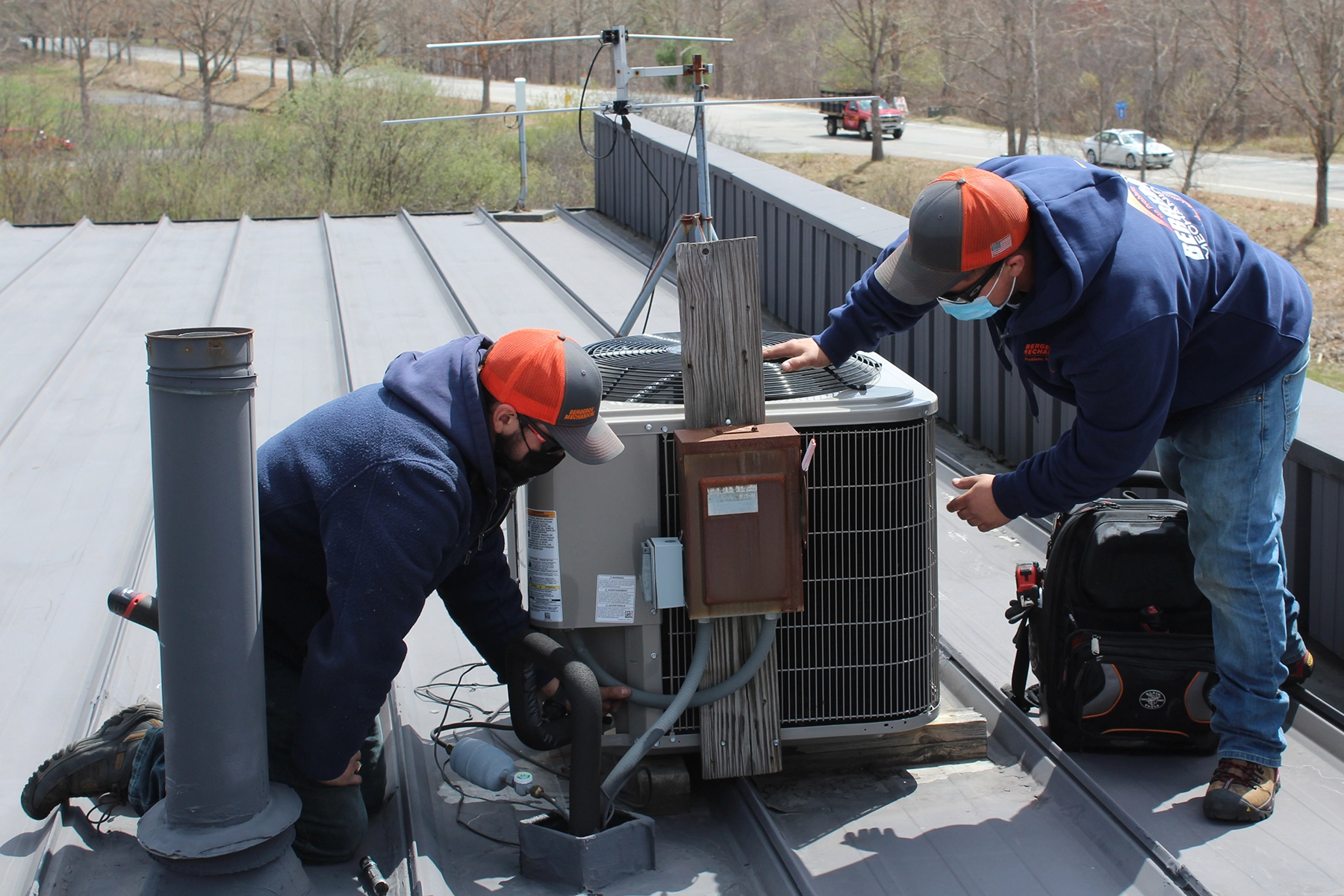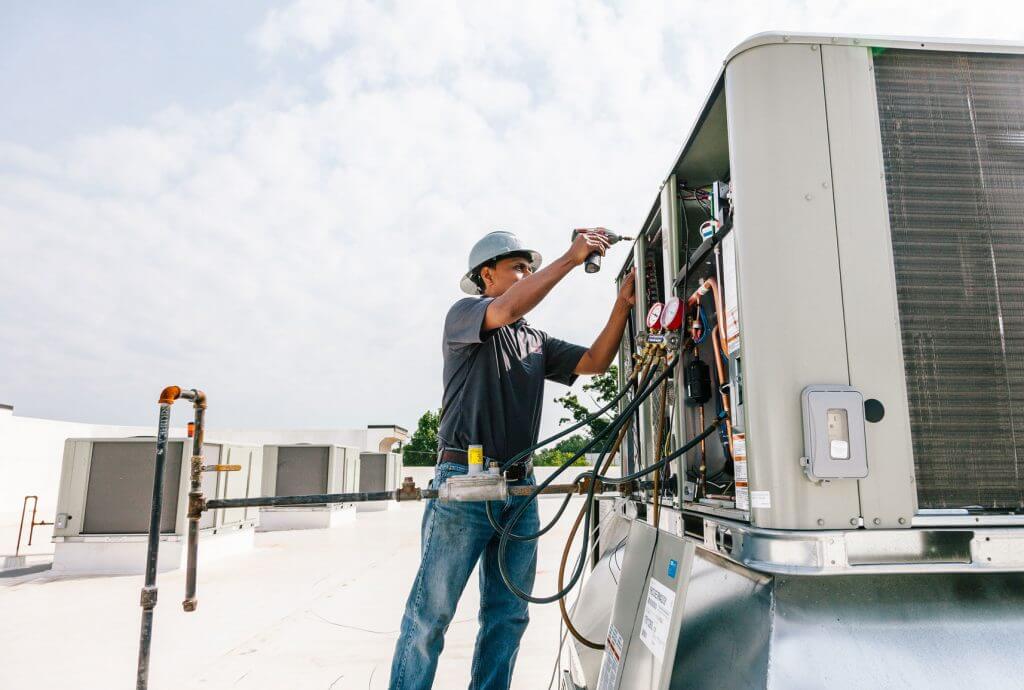Discovering the Best Heating Contractor in Brownwood TX for Your Winter Months Requirements
Discovering the Best Heating Contractor in Brownwood TX for Your Winter Months Requirements
Blog Article
The Value of HVAC Installation: Key Considerations for a Comfy Indoor Setting
The setup of a cooling and heating system is an important element in attaining an energy-efficient and comfortable indoor setting. Nevertheless, the process entails a number of nuanced considerations that surpass simply picking a system off the shelf. Elements such as the viability of the system for particular building needs, right sizing to prevent inefficiencies, and the expertise of contractors for a high quality installation play pivotal functions. Moreover, the fostering of innovative innovations can substantially improve system performance. Yet, comprehending these intricacies is simply the start of ensuring ideal indoor convenience. What are the crucial components that determine successful heating and cooling implementation?
Picking the Right System

When choosing a cooling and heating system, it is crucial to examine the capability required to efficiently heat or cool down the room without exhausting the system, which can result in raised wear and functional expenses. Consulting with a professional cooling and heating professional can give useful insights right into picking a system that aligns with both the architectural style and the awaited use patterns of the structure.
Additionally, taking into consideration the integration of wise technology can enhance system monitoring and tracking, offering greater control and prospective expense savings. By carefully assessing these elements, one can ensure the selection of an a/c system that not just fulfills immediate needs but likewise contributes to long-lasting operational sustainability and passenger comfort.
Understanding Power Efficiency
Recognizing energy performance is important when thinking about a cooling and heating setup, as it directly impacts both the environmental footprint and the operational prices of the system. High-efficiency heating and cooling systems are created to utilize much less energy to attain the very same degree of convenience as less efficient designs, thus reducing energy costs and promoting sustainability. The efficiency of a HVAC system is generally shown by scores such as SEER (Seasonal Energy Efficiency Proportion) for ac system or AFUE (Yearly Gas Usage Performance) for furnaces. Greater rankings represent higher effectiveness and decreased power consumption.

Buying an energy-efficient heating and cooling system not only converts to cost financial savings but likewise contributes positively to ecological preservation by lowering greenhouse gas discharges. In addition, many jurisdictions provide rewards or rebates for the setup of high-efficiency systems, additionally enhancing their financial appeal.
When assessing power efficiency, take into consideration sophisticated functions such as variable speed electric motors, wise thermostats, and zoning abilities. These developments improve the system's ability to get used to varying need, therefore optimizing power use. It is vital to talk to HVAC specialists that can give understandings into the best options tailored to particular climate problems and use patterns, guaranteeing optimal performance and comfort.
Relevance of Appropriate Sizing

On the other hand, a small HVAC system will certainly struggle to get to the desired temperature, particularly throughout severe weather. This can result in continual procedure, leading to greater power prices and possible getting too hot of system parts. Furthermore, insufficient sizing can lead to inconsistent temperature level circulation, creating particular areas of a structure to be as well cool or as well warm.
To achieve the appropriate sizing, a thorough lots calculation is crucial. This involves evaluating different factors such as the building's square footage, insulation levels, home window this article types, and local environment problems. By precisely identifying the home heating and cooling demands of a space, heating and cooling specialists can suggest systems that make certain effective procedure, minimized power consumption, and improved interior convenience.

Ensuring Quality Installment
A smooth a/c installation is the cornerstone of a system's longevity and efficiency. Guaranteeing quality installation includes meticulous focus to information, adherence to industry requirements, and employing competent specialists. The process starts with picking a seasoned and certified a/c contractor. This professional should have extensive expertise of diverse systems and be skilled at analyzing the particular demands of the structure.
Correct setup exceeds mere placement of equipment. It includes specific calibration to ensure ideal airflow, reliable power consumption, and consistent temperature level circulation. This includes precise ductwork setup, making sure links are safe and secure and leak-free, which is vital for preserving system effectiveness and interior air top quality.
Furthermore, the execution of advanced diagnostic tools throughout setup can identify possible problems early, protecting against pricey repair services and extending the life expectancy of the system. The contractor must additionally make certain that all parts are suitable which the system adheres to neighborhood building regulations and laws.
Routine Maintenance Practices
When the structure for a high-performing a/c system is wikipedia reference developed with quality installation, the emphasis should change to routine maintenance techniques to ensure continued performance and dependability. Routine upkeep not just expands the lifespan of the system however likewise boosts interior air quality, reduces power consumption, and avoids costly repair work. Essential upkeep jobs include consistently transforming air filters, cleansing evaporator and condenser coils, and checking the system for obstructions or leakages.
This simple task can considerably boost air flow and system efficiency. Furthermore, specialist specialists must evaluate the system each year, inspecting for refrigerant degrees, electric links, and overall system efficiency.
Focus to ductwork is also essential; sealing and cleaning air ducts frequently stops air loss and contamination. Implementing a maintenance schedule ensures that small issues are addressed before they escalate, safeguarding the system's operational stability. By sticking to these maintenance practices, home owners can optimize their HVAC system's functionality and maintain a comfy indoor environment year-round.
Conclusion
By picking a suitable system customized to particular building needs, recognizing power efficiency, and making my sources sure appropriate sizing, inadequacies can be decreased. The participation of proficient contractors guarantees top quality setup, while the integration of innovative technologies boosts system performance and tracking.
A number of kinds of A/c systems are available, including split systems, hybrid systems, duct-free systems, and packaged home heating and air systems, each with unique benefits and limitations.
Understanding energy efficiency is necessary when considering an A/c setup, as it directly influences both the environmental impact and the operational expenses of the system. The performance of an A/c system is generally shown by rankings such as SEER (Seasonal Power Effectiveness Proportion) for air conditioners or AFUE (Annual Fuel Utilization Performance) for heating systems (air conditioning repair service in Brownwood TX).Once the structure for a high-performing HVAC system is developed through high quality installation, the focus must move to regular maintenance practices to ensure continued performance and reliability. In addition, specialist specialists should inspect the system yearly, checking for refrigerant levels, electrical connections, and total system performance
Report this page